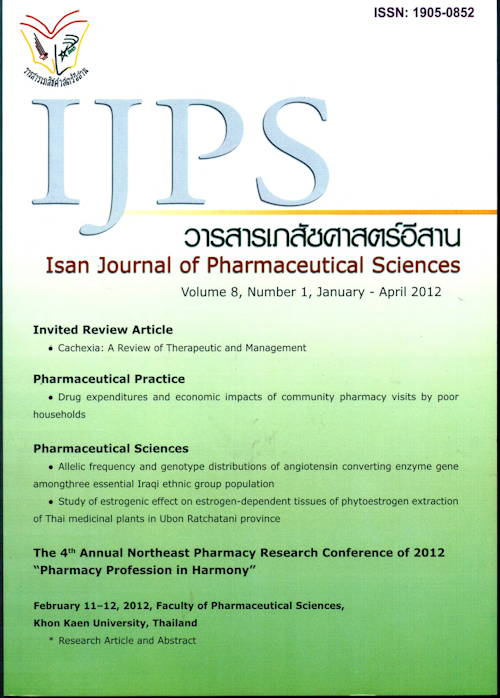Medical Representatives’ Promotional Activities to the Resident Doctors in a Medical College
Main Article Content
Abstract
Introduction: The purposes of the study were to examine the frequency of calling and forms; of promotional activities being used by medical representatives to the resident doctors in a medical college and to gather the residents’ opinions about the activities and asked for their suggestions about the appropriate practice guideline. Object and Method: Questionnaires were used to collect data from 105 resident doctors in a medical college. The data was analyzed by using frequency, percentage and data grouping. Survey Result: Most of the residents have ever met the medical representatives (95.24 %) at the frequency of 1-3 times a month (68.57%). The most frequently used promotional activity was supporting the residents with stationeries, office supplies and some small gifts (92.38%). If the promotional activity was about the academic matter, the residents mostly had an opinion that it was appropriate one. But there’s an impassive and no opinion on the recreation activities. The most satisfied promotional activity was to support the seminar expenses (30.48%). There was a little difference between residents who agree and not agree that there was an influence from medical representatives’ personality, appearance, gender and grooming on good relationship building (50.48 % and 45.71% accordingly). Most of them thought that there was not an influence from promotional activities on their prescription behavior (60.00 %). However, they believed in the information given by the medical representatives if there were reliable supportive studies (61.90%). Most had positive attitude on the promotional activities (50.48%) and agreed that there should be a practice guideline for an appropriate action of resident (53.33%). Conclusions: Medical representatives have met almost all residents by using both academic and nonacademic promotional activities. The frequencies of meeting are rather often. Thus it is needed to issue an appropriate practice guideline between resident doctors and medical representatives.
Article Details
In the case that some parts are used by others The author must Confirm that obtaining permission to use some of the original authors. And must attach evidence That the permission has been included
References
Barwise p. Ma'keter’s Toolkit. Patipon Tungjukwaranon. Bangkok; 2549.
Bellin M., McCarthy S., Drevlow L., Pierach C. Medical Student's Exposure to Pharmaceutical Industry Marketing: A Survey at One U.S. Medical School. JAMA 2004; 79: 1041-1045.
Brett A.S., Burr W., Moloo J. Are gift from Pharmaceutical Companies ethically problematic. J Arch Intern Med 2003; 163: 2213-2218.
Caudill T.S., Johnson M.S., Rich E.C., Mckinney W.P. Physicians, Pharmaceutical Sales Representatives and the Cost of Prescribing. Arch Fam Med 1996; 5(4):201-206.
Faculty of Medicine Siriraj Hospital. Residency training program for specialty physicians. Bangkok; 2550.
Hippocrates [online], n.p. [27 May 2011], Available from: http://www.historylearningsite.co.uk/hippocrates.htm
Hopper J.A., Speece M.W., Musial J.L. Effect of an educational intervention on Residents' Knowledge and Attitude towardl interaction with Pharmaceutical Representative. J Gen Intern Med 1997; 12: 639-642.
McCormick B.B., Tomlinson G., Edwards P.B., Detsky A.s. Effect of restricting contact between Pharmaceutical Company Representatives and Internal Medicine Residents on post-training attitudes and behavior. JAMA 2001; 280(10): 1994-1999
McKinney W.P.. Schiedermayer D.L., Lurie N., Simpson D.E., Goodman J.L., Rich E.c. Attitudes of Internal Medicine Faculty and Residents toward Professional Interaction with Pharmaceutical Sales Representatives. JAMA 1990; 204: 1093-1097.
Montague B.T., Julie Rosenbaum. A systematic review of curricula on relationships between residents and the pharmaceutical industry. Medical Education 2008; 42: 301-308
Peppin J.F. Pharmaceutical Sales Representatives and Physicians: Ethical Considerations of a Relationship. J Med Philos. 1990; 21(1): 83-99.
Prachoat p. Pharmaceutical of the around Rattanakosin 200 Years. Bangkok; 2520.
Reeder M.. Dougherty J., White L.J. Pharmaceutical representatives and emergency medicine residents: a national survey. Ann Emerg Med. 1993; 22(10): 1593-1596.
Saito S., Mukohara K., Bito S. Japanese Practicing Physicians' Relationships with Pharmaceutical Representatives: A National Survey. PLoS ONE [serial online] 2010; 5(8): e12193
Satian W., Seubwong W., LL.B., Thammasat University. Drugs Act 2510.Bangkok: Netiwech; 2520.
Shah V. Unethical Pharmaceutical Promotion: Now it is time to act. Journal of Clinical and Diagnostic Research [serial online] 2010; 4: 2358-2359.
Sigworth S.K., Nettleman, Cohen G.M. Pharmaceutical Branding of Resident Physicians. JAMA 2001; 280(9): 1024-1025.
Spurting G.K., Mansfield P.R., Montgomery B.D., Lexchin J., Doust J., Othman N., et al. Information from Pharmaceutical Companies and the Quality, Quantity, and Cost of Physicians' Prescribing: A Systematic Review. PLoS Medicine 2010; 7(10): 1-21.
Wattananamkul V. A gift and the closeness in: Pratyaporn V, Jangkamol K, Kusin S, Woraritraung u-rai T, Prasongbundit S, editors. A travel of a new products. Princess Maha Chakri Sirindhorn
Anthropology Centre (Public Organisation); 2007. 266-318
Wazana A. Physicians and the Pharmaceutical Industry: Is a gift just ever a gift. JAMA 2000; 283(3): 373-380.
Wit T. Dictionary of Medicine. Ed 4. Bangkok; 2550.
Zipkin D.A., Steinman M.A. Interactions Between Pharmaceutical Representatives and Doctors in Training. J Gen Intern Med 2005; 20: 777-786.


